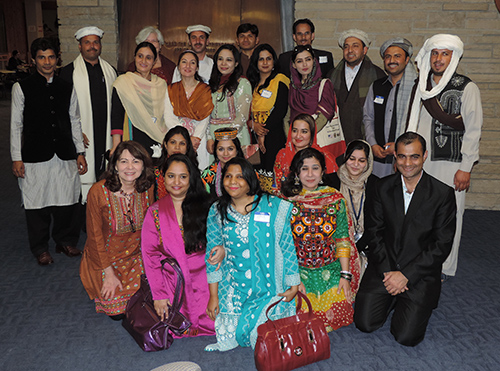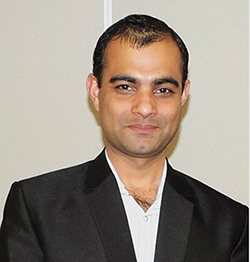
Sajid Ali Yousuf Zai is studying educational statistics and research methods at the University of Arkansas. Formerly a teacher in Pakistan, Yousuf Zai plans to work as a university teacher and researcher after he completes his doctorate.
However, Yousuf Zai is also a student of American culture and American education, and he shares his knowledge with others from his country, encouraging them to take advantage of opportunities to pursue an advanced degree in the United States so that they, also, can improve the Pakistani education system.
Yousuf Zai came to the United States in 2011 as a member of the first cohort from Pakistan to visit the University of Northern Colorado through the Teaching Excellence and Achievement program implemented by the International Research and Exchanges Board. His doctoral program is funded by the US Agency for International Development, under the Training for Pakistan Project, which is implemented by the US nonprofit World Learning.
The program is funded by the Bureau of Educational and Cultural Affairs of the U.S. Department of State. It is designed to bring secondary public school English teachers from Pakistan to the United States for six to eight weeks of professional teaching instruction including an internship in a U.S. public high school. The training covers new teaching methodologies, development of lesson planning skills, assessment techniques, teaching strategies for the home environment and the use of instructional technology in the teaching and learning process.
Every year about 40 teachers are selected from various parts of Pakistan for the program. After they complete it, they are expected to share their experiences and learning with other teachers in their community.
 Yousuf Zai enrolled in the College of Education and Health Professions at the University of Arkansas in 2012 and has returned to Colorado three times to work with the TEA program participants, the last time in late February.
Yousuf Zai enrolled in the College of Education and Health Professions at the University of Arkansas in 2012 and has returned to Colorado three times to work with the TEA program participants, the last time in late February.
"When I learned that Sajid Yousuf Zai had returned to the U.S. to pursue a doctoral degree at the University of Arkansas, I immediately realized that he could contribute significantly to the orientation activities that we conduct with the TEA-Pakistan students at the beginning of the program," said Madeline Milian, a professor of teacher education and director of the program at the University of Northern Colorado. "He is a very committed educator who cares deeply about the future of education in his country as well as the preparation of teachers in Pakistan. He was a perfect addition to our program as he could relate to the participants at two levels, first as a Pakistani educator and also as a former program participant. I believe that his most important contribution has been to share his hopes, passion, commitment, and dedication to education in Pakistan. We will very much miss him when we goes back to Pakistan, but we know that he will make meaningful contributions to the educational system in his country."
When working with the teachers from Pakistan, Yousuf Zai describes expectations of U.S. faculty. Punctuality is important, he said, and he also emphasizes academic integrity. He also tells them about various opportunities to apply for funding to study abroad and how to submit a grant proposal to TEA to help them educate their peers when they return to Pakistan. He was the first TEA participant to receive funding for that purpose.
Many people in Pakistan have misperceptions that America is unwelcoming, he said. He explains that in many places in the Unites States, especially university towns such as Fayetteville and Greeley, Colorado, people are nice, friendly and cooperative. He tells the Pakistani visitors that, depending on where they go in the United States, there are many places where it is safe to go out at night.
He encourages them not to stay in their apartments while in the United States but to get out and explore campus and the town, to make friends.
They also need to understand cultural differences related to dress. People dress less modestly in the United States than in Pakistan, he said, but that does not necessarily mean they have a bad character in any way. He told the visitors that it's OK to make eye contact and say hello to strangers most places in the United States but they should be careful about touching anyone. In the United States, shaking hands is common among both genders but in Pakistan it is not appropriate to shake hands with a woman, he said.
Carmenza Leavitt has been an assistant to the TEA program at the University of Northern Colorado since it started. She asked this year's participants to write about their experiences.
"They wrote they felt great pleasure having a former TEA Pakistan participant welcome them to ease their fears of being in a strange country with a totally different culture," Leavitt said.
Other comments from TEA participants about Yousuf Zai:
-
"He guided us about the culture of the U.S. He helped us find Pakistani food in Colorado, and taught us about time management."
-
"He assisted us to prepare ourselves for the upcoming training, adjust to a new environment and get the best and most from this experience. He also gave us advice about wanting to further our education by applying for scholarships."
-
"He captures every precious moment with his camera and gave us the pictures, gave us full support to proceed further in TEA Spring 2016 and also gave us good tips to adopt from the U.S. culture, to enjoy ourselves and work hard during the TEA program."
Ben Varner, a professor of English at the University of Northern Colorado, also met Yousuf Zai during the program in 2011.
"It's crucial that educated people come together to learn from one another, and Sajid really has been helpful in that regard during the TEA program," Varner said. "When he returns to Pakistan after completing his doctorate at the University of Arkansas, he will continue to help his fellow teachers achieve high-level outcomes from themselves and from their own students. I'm sure we'll hear more about him in the future."
Ronna Turner, associate professor of educational statistics and research methods, is Yousuf Zai's faculty advisor at the U of A.
"I have benefited greatly from working with Mr. Yousuf Zai both on a professional and personal level, and I hope that he has benefited from our collaboration as well," Turner said. "He has introduced our students and faculty to many of the cultural differences and similarities between Pakistan, the U.S., and other cultures represented by our students. He has helped me understand some of the nuances of working with males and females from Pakistan, and he has advised many students from countries such as Pakistan, Afghanistan, Saudi Arabia, and the United Arab Emirates on how to successfully navigate the higher education system in the U.S."
Yousuf Zai's interest in improving education in his country is evident through a review of his research activities, which include many studies on teacher education in Pakistan, Turner said.
"In particular, his dissertation is focused on teaching self-efficacy of both pre-service and in-service teachers in Pakistan," she said. "I am sure his colleagues are looking forward to continued collaboration with him on his return to Pakistan later this year. I am glad that Mr. Yousuf Zai chose to participate in both the TEA program and our ESRM Ph.D. program, and I expect his future work to be of great benefit to his country and to the field of education in general."
Contacts
Heidi Wells, director of communications
College of Education and Health Professions
479-575-3138,